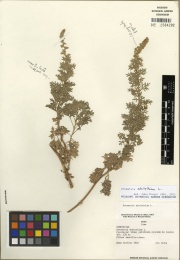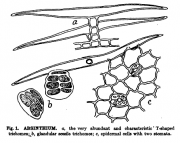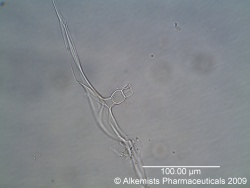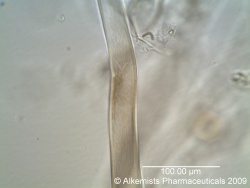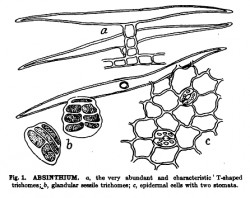Artemisia absinthium (leaf)
| Line 27: | Line 27: | ||
=Macroscopic Characteristics= | =Macroscopic Characteristics= | ||
| − | |||
| − | |||
{{Microscopy | source=Schneider, A. (1921) The Microanalysis of Powdered Vegetable Drugs, 2nd ed. | {{Microscopy | source=Schneider, A. (1921) The Microanalysis of Powdered Vegetable Drugs, 2nd ed. | ||
| − | |||
| − | |||
| color=Grayish green. | | color=Grayish green. | ||
| flavor=Very bitter, somewhat saline. | | flavor=Very bitter, somewhat saline. | ||
| − | | scent=Faintly aromatic, disagreeable and narcotic when briskly rubbed. | + | | scent=Faintly aromatic, disagreeable and narcotic when briskly rubbed.}} |
| + | =Microscopic Characteristics= | ||
| + | {{Microscopy | source=Schneider, A. (1921) The Microanalysis of Powdered Vegetable Drugs, 2nd ed. | ||
| + | | mainimage=Microanalysis_powdered_vegetable_p_200_google_ver_absinthium_figure.png | ||
| characteristics=The most distinctive tissue elements are the very abundant T-shaped, rather thin-walled trichromes with three to four basal cells; the rather large, yellowish, sessile, glandular trichromes with several vertical tiers of cells, are also quite diagnostic some pollen grains presenting the characteristics of the pollen of the order Compositae will generally be found. The vertical walls of the epidermal cells are wavy or sinuate and the stomata are abundant and fairly large. | | characteristics=The most distinctive tissue elements are the very abundant T-shaped, rather thin-walled trichromes with three to four basal cells; the rather large, yellowish, sessile, glandular trichromes with several vertical tiers of cells, are also quite diagnostic some pollen grains presenting the characteristics of the pollen of the order Compositae will generally be found. The vertical walls of the epidermal cells are wavy or sinuate and the stomata are abundant and fairly large. | ||
| Line 42: | Line 41: | ||
| }} | | }} | ||
| − | {{ | + | |
| + | {{Media3 | cat=Microscopy | ||
| mainimage=Artemisia_absinthium_L._-Asteraceae--1.jpg | | mainimage=Artemisia_absinthium_L._-Asteraceae--1.jpg | ||
| + | | source=Elan M. Sudberg, Alkemist Laboratories | ||
| companyimage=AP-LOGO-Laboratories Crop - Copy.jpg | | companyimage=AP-LOGO-Laboratories Crop - Copy.jpg | ||
| − | + | | companyURL=http://www.alkemist.com/ | |
| + | | description=Wormwood (leaf) (''Artemisia absinthium'') | ||
| caption1=T-shaped trichromes with three to four basal cells in 400X Acidified chloral Hydrate Soln. | | caption1=T-shaped trichromes with three to four basal cells in 400X Acidified chloral Hydrate Soln. | ||
| characteristics=The most distinctive tissue elements are the very abundant T-shaped, rather thin-walled trichromes with three to four basal cells, as well as the strap-shaped tubular covering trichomes when observed at 400X with Acidified chloral Hydrate Soln. | | characteristics=The most distinctive tissue elements are the very abundant T-shaped, rather thin-walled trichromes with three to four basal cells, as well as the strap-shaped tubular covering trichomes when observed at 400X with Acidified chloral Hydrate Soln. | ||
| + | | source2=Elan M. Sudberg, Alkemist Laboratories | ||
| + | | companyimage2=AP-LOGO-Laboratories Crop - Copy.jpg | ||
| + | | companyURL2=http://www.alkemist.com/ | ||
| image2=Artemisia_absinthium_L._-Asteraceae--2.jpg | | image2=Artemisia_absinthium_L._-Asteraceae--2.jpg | ||
| companyimage=AP-LOGO-Laboratories Crop - Copy.jpg | | companyimage=AP-LOGO-Laboratories Crop - Copy.jpg | ||
| caption2=Fragment of a strap-shaped tubular covering trichrome | | caption2=Fragment of a strap-shaped tubular covering trichrome | ||
| reference=British Pharmacopoeia, 2003 | | reference=British Pharmacopoeia, 2003 | ||
| − | | }} | + | | source3=Schneider, A. (1921) The Microanalysis of Powdered Vegetable Drugs, 2nd ed. |
| + | | image3=Microanalysis_powdered_vegetable_p_200_google_ver_absinthium_figure.png | }} | ||
=High Performance Thin Layer Chromatographic Identification= | =High Performance Thin Layer Chromatographic Identification= | ||
Revision as of 22:52, 16 March 2014
Contents |
Nomenclature
Artemisia absinthium L. Asteraceae
Standardized common name (English): wormwood
Botanical Voucher Specimen
|
Organoleptic Characteristics
Macroscopic Characteristics
|
Microscopic Characteristics
|
 |
 |
|
|
|
|
|
High Performance Thin Layer Chromatographic Identification
Supplementary Information
Sources
- ↑ MOBOT, Tropicos.org http://www.tropicos.org/Image/100158913
- ↑ Schneider, A. (1921) The Microanalysis of Powdered Vegetable Drugs, 2nd ed.
- ↑ Schneider, A. (1921) The Microanalysis of Powdered Vegetable Drugs, 2nd ed.
- ↑ Elan M. Sudberg, Alkemist Laboratories http://www.alkemist.com/
- ↑ Elan M. Sudberg, Alkemist Laboratories http://www.alkemist.com/
- ↑ Schneider, A. (1921) The Microanalysis of Powdered Vegetable Drugs, 2nd ed.
